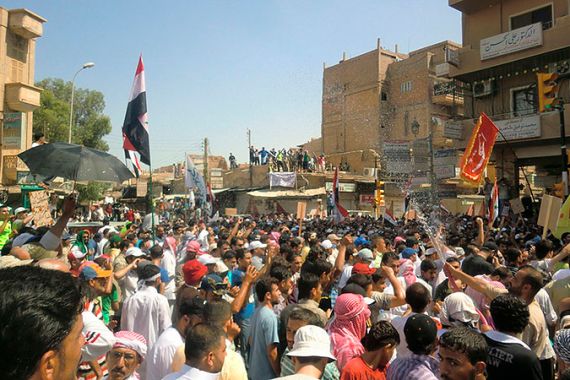Assad sacks governor following huge protests
Move seen as bid to tighten government’s grip in Deir az-Zor, after half a million people took to streets on Friday.

 |
| Samir Othman al-Sheikh takes an oath before the Syrian president as the new governor of Deir az-zor [EPA] |
Bashar al-Assad, Syria’s president, has sacked the governor of the flashpoint province of Deir az-Zor, two days after massive protests demanding his ousting were held in the oil-producing region.
Samir Othman al-Sheikh, an officer in the intelligence apparatus, was asked to replace Hussein Arnos on Sunday, while the Syrian army continued its crackdown in several towns.
Arnos, a civilian, has now been asked to govern the small province of Qunaitera west of Damascus, on the border with the Golan Heights.
The move is being seen as an attempt to tighten the government’s grip on Deir az-Zor.
 |
About half a million people took to the streets across Deir az-Zor on Friday, in one of the biggest demonstrations in recent weeks, activists and human rights campaigners said.
Deir az-Zor, which produces most of Syria’s oil, is among the poorest of the country’s 13 provinces, and a water crisis in the past six years has crippled agricultural production.
Last week, the army surrounded the town of Albu Kamal near Deir az-Zor, which borders Iraq’s Sunni heartland, after 30 soldiers defected following the killing of four protesters in the town, residents said.
Since the uprising against his regime began in March, Assad has also sacked the governors of the southern province of Deraa, cradle of the uprising, and the provinces of Homs and Hama, which have witnessed huge demonstrations.
Meanwhile, the state news agency has said that the Syrian cabinet has approved a law that will allow the formation of political parties other than the ruling Baath party, provided they adhere to “democratic principles”.
The Baath party, which has banned opposition groups since a 1963 military coup, has been under pressure to abandon its monopoly on power, as the four-month uprising refuses to die down.
“The establishment of any party has to be based on … a commitment to the constitution, democratic principles, the rule of law and a respect for freedom and basic rights,” the state news agency SANA said on Monday.
Clampdown continues
Security forces rounded up hundreds of civilians in Damascus and made arrests near Homs and in the town of Sarakeb in the northwestern province of Idlib near the Turkish border, activists said.
New amateur video shows what it says are shops in Homs and Damascus closed in protest against Assad.
In Homs, troops backed by tanks “deployed heavily in Duar al-Fakhura and around the neighbourhood of Al-Nazihin,” Abdel Karim Rihawi, who heads the Syrian League for the Defence of Human Rights, told the AFP news agency.
He said the army could be “preparing to carry out a military and security operation in the region”.
 |
The London-based Syrian Observatory for Human Rights also reported a new military deployment in Homs, quoting an activist in the city.
“Eight tanks entered the city from the Duar al-Jawwiya area and deployed in the streets linking Al-Khalidiyeh neighbourhood to two others in the area,” the observatory said in a statement received by AFP in Nicosia.
About 50 people have been killed in the past week in Homs, activists have said, accusing the regime of sowing sectarian strife among the city’s Christians, Sunni Muslims and Assad’s Alawite minority community.
Residents observed a strike on Saturday while the army encircled the city, cutting off its water and electricity.
The army had already entered the city in May to stop rallies calling for the fall of the regime.
According to the Syrian Observatory, 1,483 civilians are now confirmed dead in the government crackdown on dissent since mid-March. The violence has also claimed the lives of 365 troops and security forces, the government says.
In that time, at least 12,000 people have been arrested and thousands have fled to neighbouring Turkey and Lebanon, rights groups say.